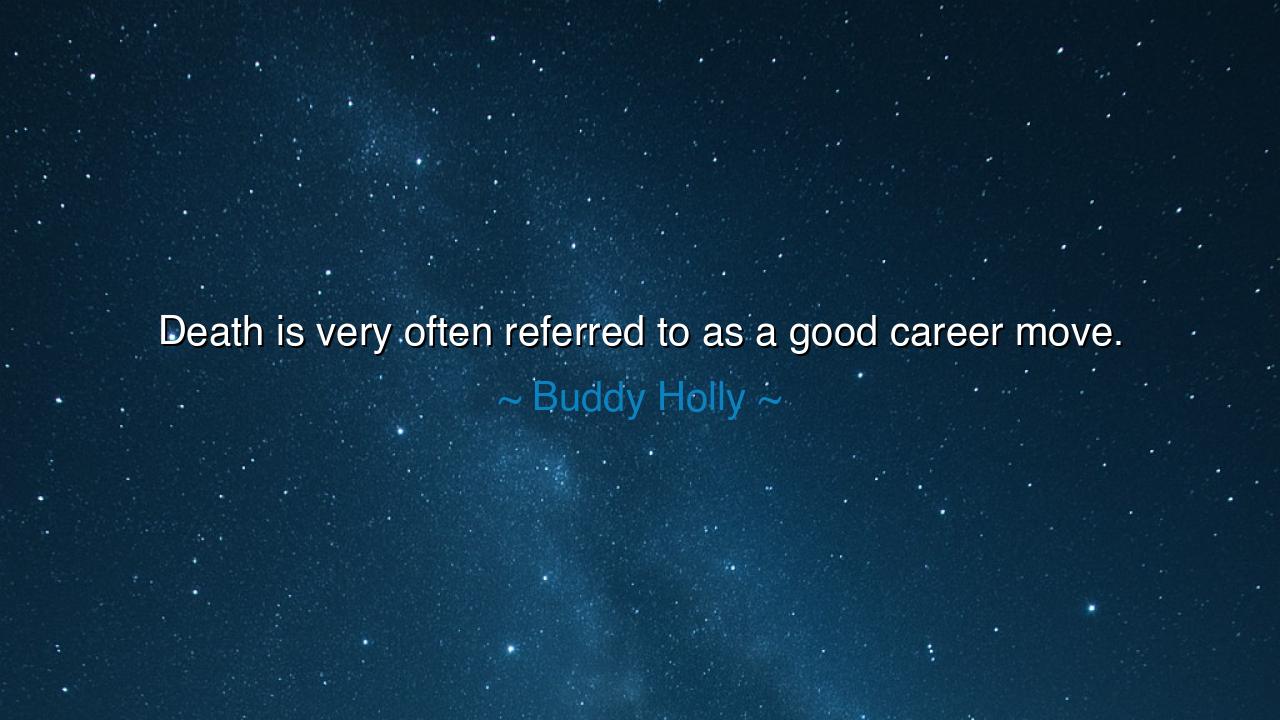
Death is very often referred to as a good career move.






The words of Buddy Holly — “Death is very often referred to as a good career move.” — shimmer with irony, wisdom, and the tragic foresight of a man whose own life would end before its prime. Beneath their light jest lies a reflection both haunting and eternal: that death, though feared by all, has the strange power to immortalize those who fall before their time. Holly, a pioneer of rock and roll, spoke with the humility and humor of one who understood fame’s fickle nature — how the world often crowns its artists only when they can no longer create. In these few words, he exposes the paradox of legacy: that mankind, blind to greatness in life, awakens only at its loss.
To understand the depth of this saying, one must remember the world from which it arose. Buddy Holly, born in Texas in 1936, burned through the music world like a comet — brief, bright, unforgettable. His sound reshaped the very rhythm of modern music, influencing generations that would follow. Yet in 1959, at the age of twenty-two, he perished in a plane crash alongside Ritchie Valens and J.P. “The Big Bopper” Richardson — an event that Don McLean would later call “The Day the Music Died.” It was after his death that the legend of Buddy Holly grew — his songs replayed, his image sanctified, his influence canonized. And thus, with a tragic irony that only life can write, his own words became prophecy: death, indeed, became a “good career move.”
But in the tone of the ancients, we see beyond the jest into the heart of truth. For in every age, the world has lifted its heroes upon pedestals only when they have vanished from it. The poets of Greece spoke of Achilles, who chose a short life of glory over a long life of obscurity. He knew that the flame that burns twice as bright consumes itself quickly — yet in that burning, it achieves immortality. So too with Holly, and with every artist who dies before their song is finished. The death of the young and gifted moves the human soul, for it mirrors our own fear of time — and our longing to preserve what we love from the decay of years.
This truth unfolds again and again throughout history. Think of Vincent van Gogh, who sold not a single painting in his lifetime but whose works now hang in temples of art across the world. Think of James Dean, the restless youth of the silver screen, whose untimely death sealed his eternal image as the symbol of rebellion and grace. Or John Keats, who died whispering, “My name is writ in water,” not knowing that centuries later his poetry would still flow like a river through the hearts of dreamers. In each, death transformed mortal brilliance into myth, and the fleeting into the eternal.
Yet Buddy Holly’s words also hold a quiet sorrow. For to call death a “good career move” is to reveal how human admiration so often awakens too late. It is not that death gives value to art, but that we, the living, fail to cherish it while it breathes among us. The ancients understood this weakness well. They told of Antigone, who defied her king to honor her fallen brother, teaching that reverence belongs not only to the dead, but to the living. Holly’s remark, then, is not a cynical jest, but a plea — that we learn to see greatness before it becomes a eulogy.
The wisdom to take from his words is this: celebrate life while it is still singing. Do not wait for the silence of loss to recognize the beauty that surrounds you. Praise the artist while he still paints, thank the teacher while she still teaches, and love the friend while they still stand beside you. For though death may polish the image of the departed, it cannot add one more note to their song. The true reverence for life lies not in mourning the gone, but in honoring the living — in gratitude, in recognition, in presence.
Thus, let Buddy Holly’s words echo through the ages as both warning and blessing. Death may immortalize, but only life can create. The world will always be tempted to worship its fallen stars; but wisdom calls us to light our candles for the living, to listen to their voices now, and to speak our love before the silence comes. For one day, all songs end — and the greatest “career move” of all is not to die remembered, but to live fully, gratefully, and awake to the music that still plays in our fleeting, miraculous days.






AAdministratorAdministrator
Welcome, honored guests. Please leave a comment, we will respond soon